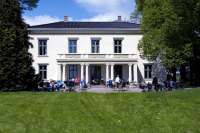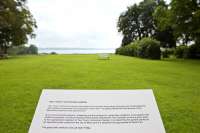Two Years’ Untouched Garden 6th Momentum Biennial Moss, Norway (2011) Two Years’ Untouched Garden was Wooloo’s proposed work for the 6th Momentum Biennial. The work was to be a sculptural intervention among the gardens and grounds of the historical villa that houses the F15 gallery in Moss, Norway. The intervention reconsiders the centuries-long tradition of pruning and landscaping the local environment by proposing to leave the F15 garden fallow from the opening of this Momentum biennial until the next in 2013. The garden plays a central role in the villa’s outward appearance and has done so since the building was constructed. Over the years, the garden has been shaped and restructured by several different designs depending on the specific fashion of its historical period. This development continues today, with the municipality of Moss preparing an elaborate plan for the future development of the garden and its surrounding area. Wooloo’s proposal was to put these maintenance plans on hold - a conceptual response to the so-called ”REDD” (Reducing Emissions from Deforestation and forest Degradation) program run by the United Nations. First initiated in 2008, REDD is one of the few political commitments to come out of the COP15 Climate Summit in Copenhagen. REDD was founded by Norway, the country which is still by far the greatest donor to the program. In short, the aim of REDD is to compensate certain developing countries for not cutting down their national forests and thereby releasing the CO2 stored in their trees. The founding agreement of the program is Norway’s promise of 1 billion US dollars to Indonesia if the Indonesian forestry service decreases its annual deforestation to 1 million hectares of forest. This agreement was made in 2010, the same year that Norway invested more than 20 billion US dollars in its oil industry, producing an average of 2.2 million barrels of oil per day. In other words, Norway earns an enormous amount of revenue by adding to the oil pollution the planet, while simultaneously using part of this income to pay a developing nation to put its own development and industry on hold – thus contradicting its environmental values. By means of extending the official methodologies and calculations promoted by the REDD program and its carbon-offsetting approach, Wooloo’s work for Momentum argued for a complete halt on the cutting of grass and trees and any other human alterations to the natural growth of the F15 garden for a period of two years. However, due to local protests and pessimistic viewpoints – some thought the work would lead to “jungle-like conditions” in the garden - the parkland proprietor of the Moss Municipal Real Estate Department forbid to let the grass grow. In the organization’s rejection of Two Years’ Untouched Garden, it is stated that the garden serves as an important public symbol for the city of Moss and it is therefore not appropriate to leave it be. The grass will continue to be cut each Friday.
Two Years’ Untouched Garden 6th Momentum Biennial Moss, Norway (2011) Two Years’ Untouched Garden was Wooloo’s proposed work for the 6th Momentum Biennial. The work was to be a sculptural intervention among the gardens and grounds of the historical villa that houses the F15 gallery in Moss, Norway. The intervention reconsiders the centuries-long tradition of pruning and landscaping the local environment by proposing to leave the F15 garden fallow from the opening of this Momentum biennial until the next in 2013. The garden plays a central role in the villa’s outward appearance and has done so since the building was constructed. Over the years, the garden has been shaped and restructured by several different designs depending on the specific fashion of its historical period. This development continues today, with the municipality of Moss preparing an elaborate plan for the future development of the garden and its surrounding area. Wooloo’s proposal was to put these maintenance plans on hold - a conceptual response to the so-called ”REDD” (Reducing Emissions from Deforestation and forest Degradation) program run by the United Nations. First initiated in 2008, REDD is one of the few political commitments to come out of the COP15 Climate Summit in Copenhagen. REDD was founded by Norway, the country which is still by far the greatest donor to the program. In short, the aim of REDD is to compensate certain developing countries for not cutting down their national forests and thereby releasing the CO2 stored in their trees. The founding agreement of the program is Norway’s promise of 1 billion US dollars to Indonesia if the Indonesian forestry service decreases its annual deforestation to 1 million hectares of forest. This agreement was made in 2010, the same year that Norway invested more than 20 billion US dollars in its oil industry, producing an average of 2.2 million barrels of oil per day. In other words, Norway earns an enormous amount of revenue by adding to the oil pollution the planet, while simultaneously using part of this income to pay a developing nation to put its own development and industry on hold – thus contradicting its environmental values. By means of extending the official methodologies and calculations promoted by the REDD program and its carbon-offsetting approach, Wooloo’s work for Momentum argued for a complete halt on the cutting of grass and trees and any other human alterations to the natural growth of the F15 garden for a period of two years. However, due to local protests and pessimistic viewpoints – some thought the work would lead to “jungle-like conditions” in the garden - the parkland proprietor of the Moss Municipal Real Estate Department forbid to let the grass grow. In the organization’s rejection of Two Years’ Untouched Garden, it is stated that the garden serves as an important public symbol for the city of Moss and it is therefore not appropriate to leave it be. The grass will continue to be cut each Friday.

